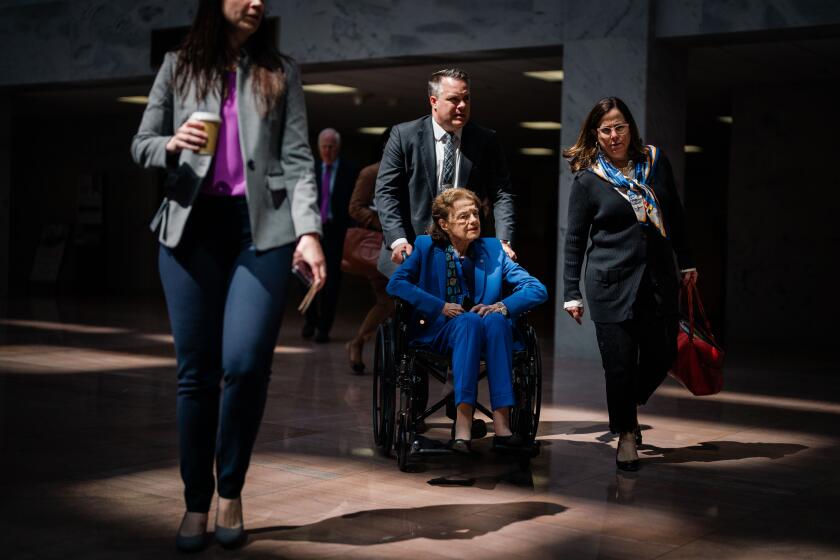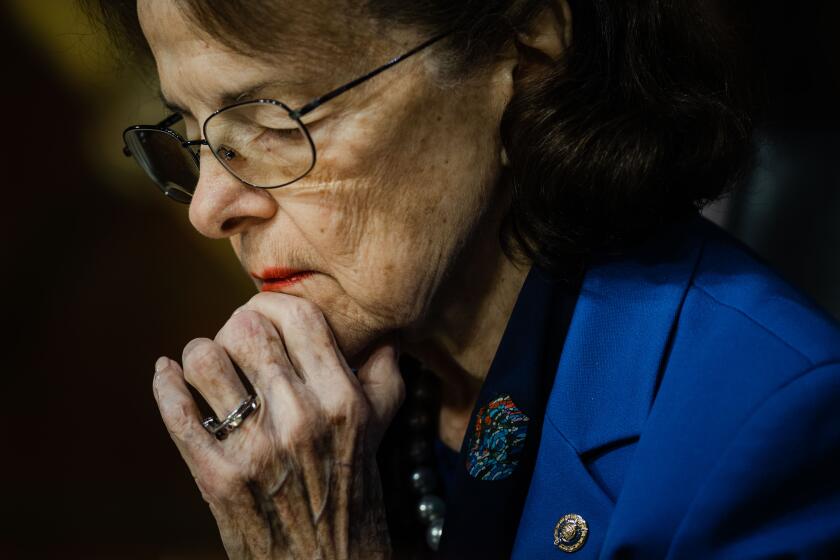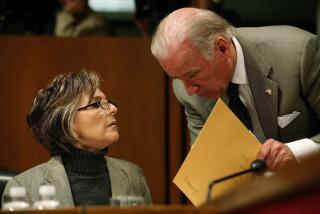Column: Barbara Boxer warns progressives to back off on Dianne Feinstein or they may be sorry
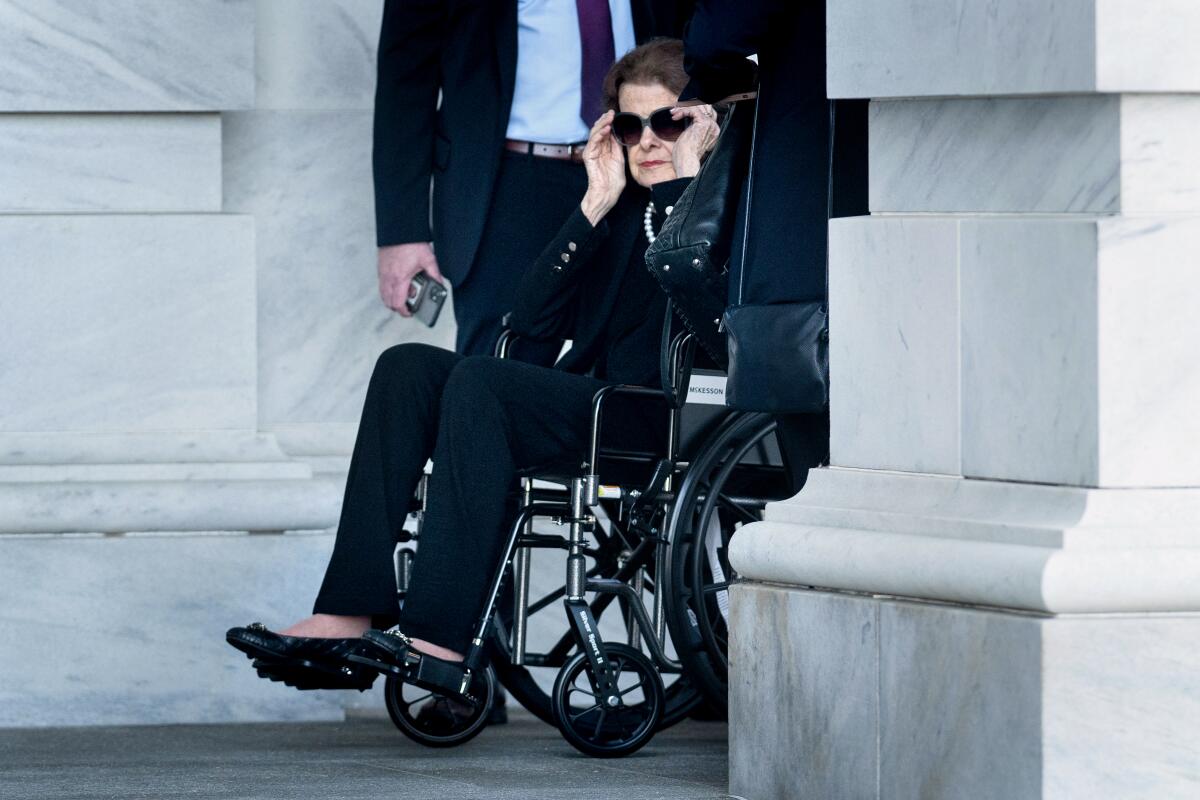
- Share via
Barbara Boxer was once among the most liberal members of the U.S. Senate, a favorite of progressives, who much preferred her over California’s other Democratic senator, the more staid and centrist Dianne Feinstein.
So it’s noteworthy to hear Boxer’s advice for those most fervently wishing that Feinstein, who’s dealing with well-chronicled maladies, would immediately join her in post-Senate retirement.
“I think the far left of my party, who’s agitating for this, ought to smell the roses,” Boxer said.
As in, get real.
She sees no guarantee that Republicans would allow another Democrat to replace the 89-year-old Feinstein on the Senate Judiciary Committee. In fact, Boxer is convinced they would not.
“They’ve already showed their hand,” she said, by refusing to let a temporary replacement fill in while Feinstein recuperates from shingles and its severe side effects. “I think it speaks volumes to their lack of humanity.”
Without a tiebreaking Democratic vote on the committee, Republicans could ice President Biden’s judicial nominees for the remainder of his term — the very thing Feinstein’s critics presumably want to avoid.
So it would be best, Boxer suggested, for Feinstein to remain until her intended January 2025 retirement date, staying on hand for critical votes when Democrats — who control the Senate by a bare 51-49 majority — need her.
Not ideal. But then nothing about Feinstein’s situation is.
Sen. Dianne Feinstein’s absence from work exposed a deep distrust permeating U.S. Senate that could undercut an essential piece of President Biden’s agenda.
In November 1992, Boxer and Feinstein made history by simultaneously winning California’s two U.S. Senate seats. They were dubbed “Thelma and Louise,” after the road-tripping cinematic outlaws; it was somewhat sexist, true, but also reflected the mildly transgressive nature of the women’s side-by-side candidacies.
Speaking this week via Zoom from her home outside Palm Springs, Boxer produced several keepsakes from that campaign, including a cartoon of the pair as their movie counterparts, barreling joyously down the highway in an open-top convertible.
Feinstein “grabbed me by the hand and never let go. I wouldn’t have won without her,” Boxer said of that first Senate campaign with her unofficial running mate, who had waged a strong 1990 race for governor after serving nearly a decade as San Francisco mayor. “She was so popular. And I was like ‘Barbara Who?’”
She laughed.
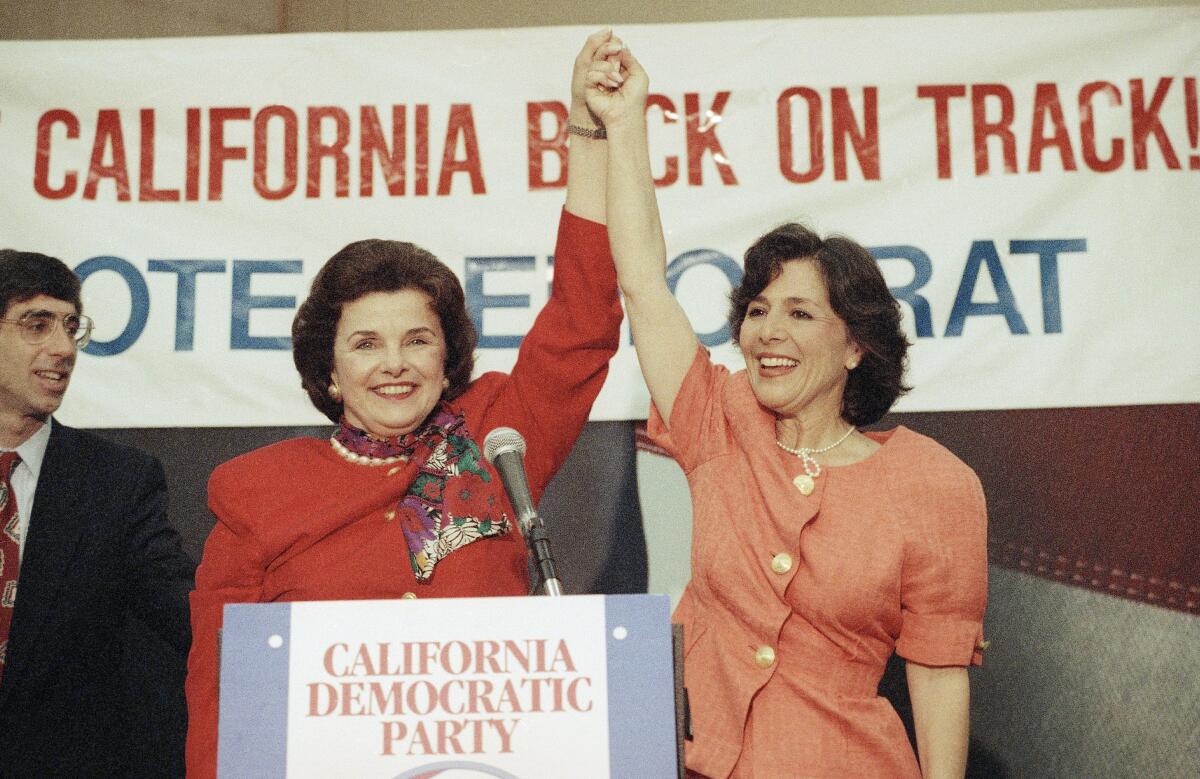
Boxer opted against seeking a fourth term, leaving the Senate in January 2017 at age 76. She recalled Feinstein being somewhat annoyed: “She said, ‘Why would you do that? You’re at the top of your game.’”
Two summers ago, Boxer subtly suggested to Feinstein that perhaps it was time for her to move on from the Senate as well. There’d been another raft of reports about Feinstein’s declining physical and mental capacities.
“Only you can decide this,” Boxer said in an interview then, as though addressing her former colleague. “But from my perspective, I want you to know I’ve had very productive years away from the Senate doing good things. So put that into the equation.”
Boxer said she changed her mind about Feinstein’s departure after Senate Republicans blocked allowing a place-holder to fill in for her on the Judiciary Committee. “They forced her back,” Boxer said, even as “they claim to love and respect” the California Democrat.
If a Republican had been incapacitated, Boxer suggested, Feinstein — always a stickler for order — “would have led the fight for them to recuperate” without losing a seat on the committee. “I know that,” she said.
Jerry Roberts, who’s followed Feinstein’s career for nearly 50 years, says adversity has steeled her against pressure to retire amid doubts about her capability.
In a recent column, the Washington Post’s veteran congressional correspondent, Paul Kane, contrasted the “public shaming” Feinstein has faced with the adulation surrounding several male senators who suffered physical infirmities as they clung to their Senate seats.
Boxer served alongside several of them. But unlike those who see a double standard in the treatment of Feinstein, Boxer doesn’t believe sexism is at work. “I think it’s a function of two things,” she said, pointing to the narrow balance of power on the Judiciary Committee and Feinstein’s “Republican colleagues not helping her.”
And there’s something else, Boxer noted: The proliferation of social media and technology that puts a camera and tape recorder in virtually every citizen’s pocket. Feinstein’s frailty and failings can be minutely cataloged and widely disseminated, and often are, in ways that aging lawmakers were previously spared.
But perhaps the biggest difference, Boxer suggested, is a change in the political climate, which, in just the few years since she left the Senate, has grown more harshly adversarial and personally brutish. “It’s tough,” she said of Feinstein’s unhappy circumstance. “It’s tough.”
The two aren’t especially close, but they’ve kept in touch since Boxer departed Washington, talking occasionally and exchanging catch-up emails.
“This is politics,” Boxer went on, “no question. No one could be more mindful of that.” In fact, Boxer was never one during her decades in Washington to shrink from a partisan brawl.
“But kindness ...” and her voice briefly trailed off. “Kindness. The Republicans could have spared her all this aggravation.”
Instead, we’re witnessing a sad last chapter in Feinstein’s otherwise stellar career.
More to Read
Get the latest from Mark Z. Barabak
Focusing on politics out West, from the Golden Gate to the U.S. Capitol.
You may occasionally receive promotional content from the Los Angeles Times.

